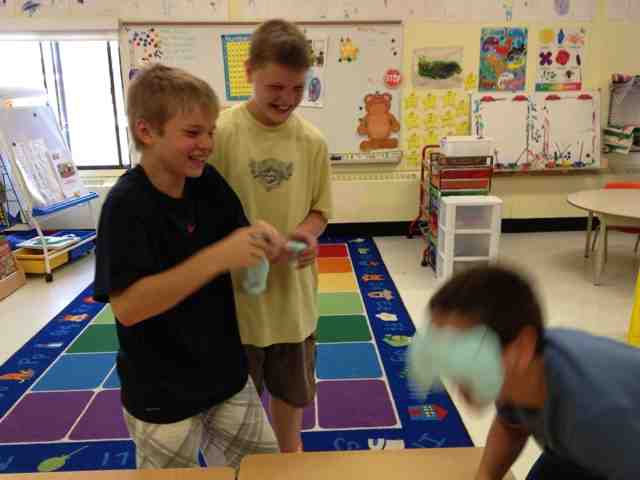We didn't just "make goop" this week ... Students dove head first into their own inquiry. Here's the story:
Naturally, the students suggested that we make more. We researched the ingredients (which I had on had because I had been waiting for a rainy day to make this stuff), took a walk down to the breakfast kitchen to get the materials and supplies and got to work!
From start to finish, students were incredibly engaged. Science lends itself quite naturally to the FDK program and this experiment was no exception. We have since made two batches and the learning has been endless. Kids LOVE goop! There's something about that sticky, gooey, malleable, slimy stuff that 5 year olds love. I know I'm totally dating myself, but if you're wondering what it reminds me of, its Robin Williams Flubber. Haha.
Here's the recipe and instructions (so simple!):
1 1/2 cups warm water
2 cups elmer white glue
food coloring
1 1/3 cups warm water
3 teaspoons borax
2 cups elmer white glue
food coloring
1 1/3 cups warm water
3 teaspoons borax
1. In one container mix 1 1/2 cups warm water, white glue and a few drops of food colouring.
2. In a second container mix 1 1/3 cups of warm water and Borax.
3. Mix the Borax mixture into the glue mixture until combined (may be some liquid in bottom of container).
4. Place Fubber on a tray and let stand for a few minutes before playing with it!
5. Store in air tight container.
Here's the link: <a href="http://www.food.com/recipe/flubber-134095?oc=linkback">http://www.food.com/recipe/flubber-134095?oc=linkback</a>
2. In a second container mix 1 1/3 cups of warm water and Borax.
3. Mix the Borax mixture into the glue mixture until combined (may be some liquid in bottom of container).
4. Place Fubber on a tray and let stand for a few minutes before playing with it!
5. Store in air tight container.
Here's the link: <a href="http://www.food.com/recipe/flubber-134095?oc=linkback">http://www.food.com/recipe/flubber-134095?oc=linkback</a>
I have a couple of Grade 5/6 boys who come to help me at recess (i.e. stack chairs, clean the tables, sweep the floor, empty the water table, etc) and even THEY got a kick out of the goop. Usually when they finish their jobs, I let them play floor hockey in my room ... They are hockey crazy. This week they gave up the hockey sticks to play with the flubber instead.
And to think ... If the goop had stayed in the little girls bag, none of this would have happened.





